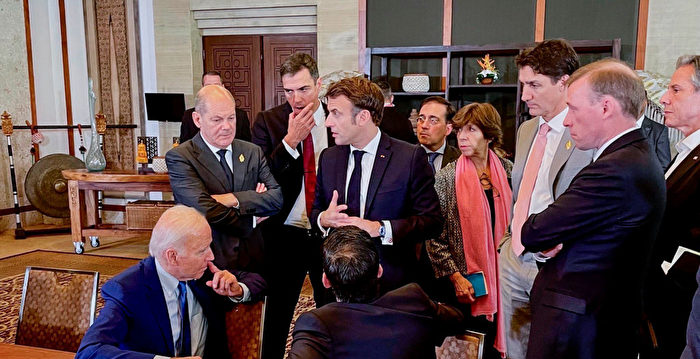[The Epoch Times, November 15, 2022](Comprehensive report by Epoch Times reporter Xu Jian) After the two-day Group of Twenty (G20) summit ended, on Wednesday (November 16), the G20 Group announced in the Leaders’ Declaration “Most members strongly condemn the war in Ukraine” and demanded that Russia unconditionally withdraw its troops, but the declaration also showed differences among different countries.
During the G20, Russian Foreign Minister Lavrov attended the summit on behalf of Putin. He appeared to be more isolated internationally and was in an awkward situation. He had been sitting and listening to the leaders of many countries condemning Russia’s brutal invasion. Chinese Foreign Minister Wang Yi may be the only one who sat down with him one of the foreign officials. At the same time, the attitudes of the CCP and India towards the Russo-Ukraine war have been closely watched by the outside world.
G20 strongly condemns Russia but divided
Although countries also discussed factors such as inflation and climate, the Russo-Ukrainian war was the dominant issue at the G20 meeting.
Before the meeting, it was not clearG20Will there be agreement on a final statement,In the end, the leaders of many countries unanimously supported Indonesian President Widodo to issue a leader’s declaration,Compromising language was used in the declaration, which also showed divisions among the participating countries, such as “a majority of members strongly condemned the war in Ukraine” – a phrase that Russia, a G20 member, objected to.
The declaration warned that “the use or threat of use of nuclear weapons is unacceptable. Peaceful resolution of conflicts, efforts to resolve crises, as well as diplomacy and dialogue are essential. This must not be an era of war.”
The declaration emphasized that the war in Ukraine “is causing enormous human suffering and exacerbating existing vulnerabilities in the global economy — constraining growth, exacerbating inflation, disrupting supply chains, exacerbating energy and food insecurity, and exacerbating financial stability risks”.
However, the declaration acknowledged that “there are other views and different assessments of the situation and sanctions,” reflecting differences among the G20 countries on the issue, with the attitudes of China and India causing concern.
A missile attack on Poland before the meeting concluded, whatever the outcome of the international investigation into the deadly attack, underscored how any miscalculation in a brutal war could lead to an escalation and drag other powers into it. China and India are considered to have close ties with Russia, and Xi Jinping and Modi’s stance on Russia at the G20 has attracted attention from the outside world.
In a series of bilateral talks with Western leaders, Xi called for a ceasefire and agreed against the use of nuclear weapons, but made no public commitments – such as persuading his “old friend” Putin to end the war.
Xi Jinping made no mention of Ukraine in his G20 speech. On the contrary, he criticized the United States for “drawing ideological boundaries” and “fueling group politics and group confrontation” without naming names. When reporting on the Ukrainian issue between Xi Jinping and Western leaders, the CCP’s official media reports used terms such as “Ukrainian crisis” or “Ukrainian issue” and avoided using the word “war.”
Beijing has resisted calling the military aggression an “invasion” or “war” since Russian tanks rolled into Ukraine in February, and has helped expand Russia’s propaganda while blaming NATO and the United States for the conflict and denouncing U.N. sanctions .
Chinese Foreign Minister Wang Yi said that Xi Jinping reiterated his stance that a nuclear war cannot be fought during his meeting with Biden, but Wang also praised Russia for taking the same stance—“Russia has recently reiterated that ‘a nuclear war cannot be won and must not be fought’ This shows Russia’s rational and responsible attitude.” Xinhua News Agency quoted Wang Yi as saying.
“The present era must not be the (era of war)”
Compared with China’s ambiguous position, India’s shift is more obvious-New Delhi is willing to play a greater role in engaging with all parties.
The draft leaders’ declaration also includes a quote from Indian Prime Minister Narendra Modi: “The present era must not be (the era of war).” This is what Modi told Putin during a regional summit in Uzbekistan in September. In his opening remarks at the summit on Tuesday, Modi called on leaders to “find a way to return to the path of ceasefire, diplomacy in Ukraine”.
CNN quoted Happymon Jacob (Happymon Jacob), an associate professor at Jawaharlal Nehru University in New Delhi, as saying that the inclusion of Indian leaders in the leaders’ manifesto “means that Western leaders are listening to India. As the opinion of key stakeholders in the region, because India is a country that is close to both the West and Russia”. He also said, “We see that India is disconnected from Russia in many ways.”
Responsible editor: Lin Yan#
